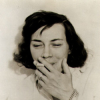Patricia Highsmith

Patricia Highsmith
Patricia Highsmithwas an American novelist and short story writer, known for her psychological thrillers, which led to more than two dozen film adaptations. Her first novel, Strangers on a Train, has been adapted for stage and screen numerous times, notably by Alfred Hitchcock in 1951. Highsmith wrote 22 novels, including her series of five novels with Tom Ripley as protagonist, and many short stories. Michael Dirda observed, "Europeans honored her as a psychological novelist, part of an existentialist tradition represented...
NationalityAmerican
ProfessionNovelist
Date of Birth19 January 1921
CountryUnited States of America
How was it possible to be afraid and in love... The two things did not go together. How was it possible to be afraid, when the two of them grew stronger together every day? And every night. Every night was different, and every morning. Together they possessed a miracle.
Dusk was falling quickly. It was just after 7 P.M., and the month was October.
The night was a time for bestial affinities, for drawing closer to oneself.
The kiss became the narrowed center of the still point of the turning world, so that even the park was turning in comparison to the still peace at their lips.
It always gets late with you. - Is that a compliment?
In view of the fact that I surround myself with numbskulls now, I shall die among numbskulls, and on my deathbed shall be surrounded by numbskulls who will not understand what I am saying ... Whom am I sleeping with these days ? Franz Kafka.
Then Carol slipped her arm under her neck, and all the length of their bodies touched fitting as if something had prearranged it. Happiness was like a green vine spreading through her, stretching fine tendrils, bearing flowers through her flesh. She had a vision of a pale white flower, shimmering as if seen in darkness, or through water. Why did people talk of heaven, she wondered
How easy it was to lie when one had to lie!
Life is a long failure of understanding ... a long, mistaken shutting of the heart.
Each book is, in a sense, an argument with myself, and I would write it, whether it is ever published or not.
What was it to love someone, what was love exactly, and why did it end or not end? Those were the real questions, and who could answer them?
One situation – maybe one alone – could drive me to murder: family life, togetherness.
I have Graham Greene's telephone number, but I wouldn't dream of using it. I don't seek out writers because we all want to be alone.
But there were too many points at which the other self could invade the self he wanted to preserve, and there were too many forms of invasion: certain words, sounds, lights, actions his hands or feet performed, and if he did nothing at all, heard and saw nothing, the shouting of some triumphant inner voice that shocked him and cowed him.